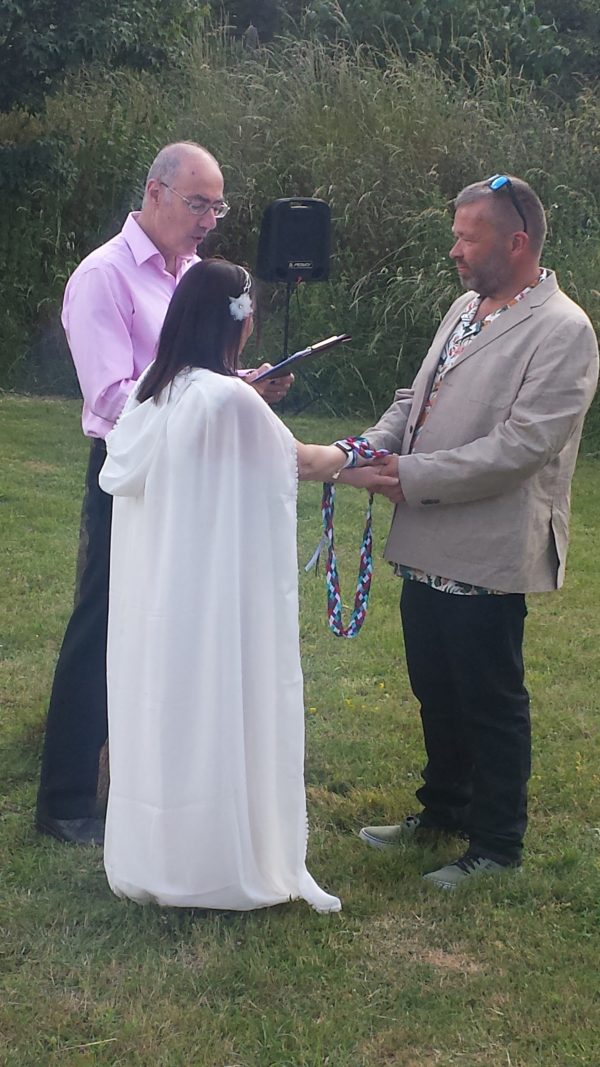
by Michael | Jan 28, 2019 | Blog
In my role as a civil celebrant, I meet a lot of people who have been fed myths about marriage options . My goal is to bust at least a few of them!
Myth no. 1
“You can
only marry in a church (or equivalent) or a register office.”
There are
actually three ways you can marry.
Firstly, through your church or synagogue etc. You will have a full religious ceremony, which will include the legal bits. There isn’t much opportunity for personalising the ceremony, though.
Secondly, through your Register Office. This ceremony will not include any religious references, let alone the name of God. Like the religious ceremony, it will not be very personal to you (if at all).
The Registrars will come out to a chosen venue, if you want – but this comes at quite a financial cost!
The third option is to use a civil celebrant. This ceremony can be totally unique to you, but it will not be legal. Usually, couples get legally married by the Registrar and then move on to have the ceremony of their dreams in front of their chosen guests, which the celebrant writes and conducts.
Myth no. 2
“You have to
marry in church or at the Register Office.”
Although
these options are of course available, as I have suggested above, these are not
the only possibilities. You can marry where you like (subject to payment,
permission or agreement!).
At present, the registrars will come out and conduct their ceremony anywhere, so long as there are four solid walls. (They charge quite a bit for this, as I have indicated.) Legislation may change to allow them to perform marriages in the open air too, but this is as yet uncertain.
At present, a civil celebrant can conduct a service anywhere, indoors or outdoors. The venue can vary considerably: I have officiated at the Savoy, Stonehenge, on an exposed hilltop with fabulous views, at a canal-side sanctuary, in a (glorious) back garden – and the list goes on! You are limited only by your imagination.
Myth No. 3
“You need to
take out a mortgage just to afford a wedding.”
Depending on the budget you have in mind, this may indeed not be a myth! However, as I suggest in a number of my blogs, there are ways to save money – eg https://vowsthatwow.co.uk/marriage-costs/
Obvious ways include reducing the guest list and choosing a modest venue. You can also save money by marrying out of season and even in the afternoon and midweek. Please glance through some of my suggestions.
A lot of people want to be married by a celebrant. They know they can’t dispense with the legal ceremony, and then realise they have to pay the Registrars and the Celebrant too. There is a way round this.
Go (by appointment) to the Register Office before the appointed wedding day (hours or even days before). Go with two witnesses, and you will be legally married. This will cost much less than paying the Registrars to come to your venue. The savings you make can go on hiring a celebrant for your tailor-made ceremony!
So you actually
have a lot more choice than you may have realised!
I hope this has been useful in pointing out what may not be obvious. If you have any enquiries, then do contact me. If you know of any other myths that need clarification, let me know and I’ll be glad not to have to think up another subject for a blog!
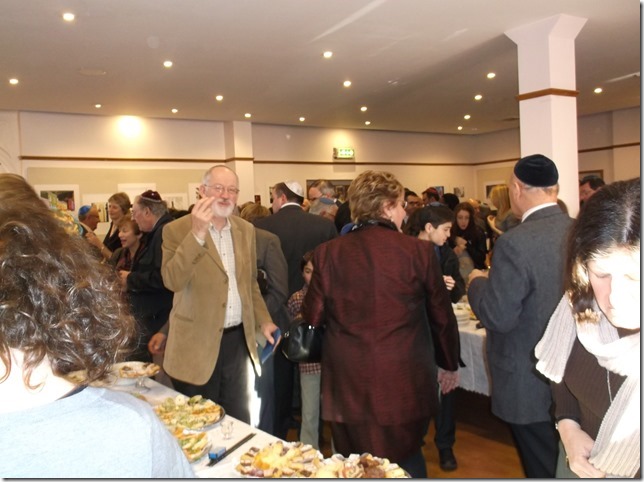
by Michael | Dec 31, 2018 | Blog
As you’re probably reading this around the New Year, your next special occasion may well be New Year’s Eve. Well, to be honest, I don’t think I can help you there!
However, I might be more useful to you in some other areas. So please read on!
What about your Birthday!
When that comes round, how do you plan to mark the occasion? Off down the pub? Throw a party? A special outing? A restaurant meal out together with family or friends, or both?
![DSCF0126[2]](https://vowsthatwow.co.uk/wp-content/uploads/2015/02/DSCF01262.jpg)
What if it’s a “big” birthday, though? Ever thought of adding an extra dimension to the affair? (And if it’s not your birthday and you’re having a peek out of curiosity, you may consider adapting the following and organising this as a surprise!).
If you’ve decided on an event with guests, then why not book a civil celebrant? With your input, he can come up with the right words, maybe a blessing (which may or may not be religious) and perhaps a short summary of your life and achievements. It needs last 5-10 minutes only, and could end, say, with a toast being proposed. It would be something very special and memorable.
Note that if you are organising this at a restaurant or hotel, you need to check practicalities (especially if you’re sharing the room with the public!).
Happy Anniversary!
Anniversary celebrations are catching on these days. There are lots of reasons to have these. Just a few examples would be:
- to mark an anniversary ending in -5 or -0
- to renew vows (because circumstances may have changed)
- to announce to the world that you’ve successfully come through a difficult period
Whatever the reason, your celebrant can help you mark the occasion in a way that reflects your personalities. The ceremony may last 10-25 minutes (or whatever you choose), and can include religious components, if you want these, or none. You can put in music, readings (secular or otherwise), reciting of vows (new or old) and rituals (such as both of you lighting a Unity Candle – even in conjunction with your children).
So whether someone is planning a surprise or whether you’re choosing this for yourself, your civil celebrant can work with you to create a tailor-made ceremony of your dreams, and will conduct it for you memorably and professionally.
So, for your next special occasion, how about a ceremony that is personal and maybe a little bit unconventional?
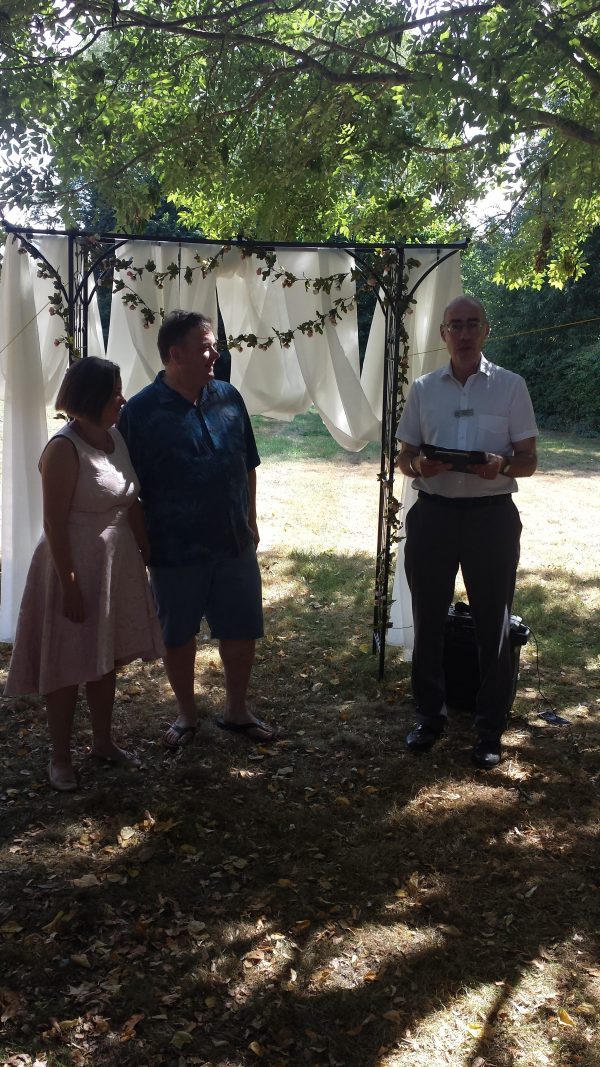
by Michael | Nov 26, 2018 | Blog
You may never even have considered renewing your vows, but one of the beauties of such a ceremony (as opposed to a wedding, say) is that you have real choice. There are some wonderful venues out there.
Depending on your budget, you can hold a vast, lavish affair for a hundred or more in a plush hotel. Alternatively, you might prefer a modest ceremony in your back garden for close family and friends.
A wedding may require a church service or a registrar ceremony; the planning (ceremony and reception) may involve family; you may have to organise any, or all, of: venues, catering, flowers, photographers, evening entertainment – all the trimmings.
For a Vow Renewal, you invite who you want, and prepare the ceremony that you want, at the place that you want. (This may be with the help of a civil celebrant, but not necessarily.) The size and scope will be down to you.
To give you some idea of what you can have, I’d like to look at three Vow Renewals that I recently played a part in.
Three Differing Examples
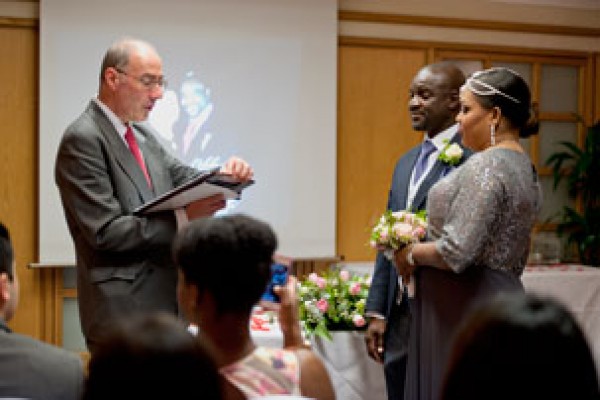
A London hotel
One was fairly conventional (and that’s in no way a criticism!). It took place in a lovely Mayfair hotel, the Washington, before a couple of dozen guests. The room was opulent, but not overstated; there was a slide-show in the background, and the ceremony featured a moving, piece of music sung by a wonderful soprano.
The attention to detail by the staff was excellent, and we enjoyed a reception in the same room after the service. Though quite formal, it was a real feel-good affair.
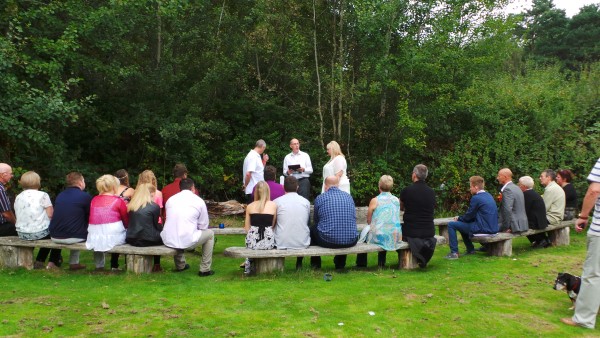
Messing About on the … Canal
Another couple were mad about barges, so Basingstoke Canal Centre made perfect sense for their venue.
The hire costs were negligible, as we used a secluded area in a wood with a tree trunk as a table, and benches made from trees, so the atmosphere was lovely. Dress was informal. The only expense (apart from refreshments, which the couple brought with them) was to hire a yurt for the reception (and for the ceremony, in case of rain). Again, we were only a couple of dozen chosen people.
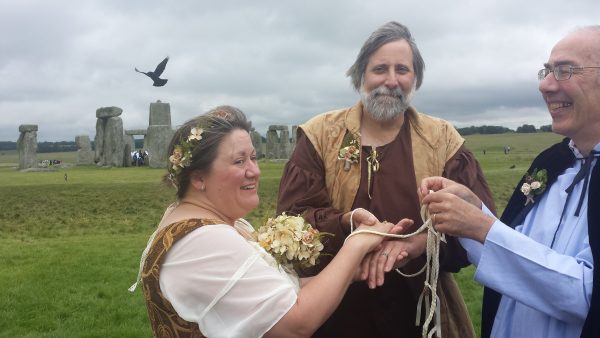
Stonehenge
Finally, how about a handfasting ceremony at Stonehenge? How atmospheric is that?
Actually, the atmosphere was different to what we expected, as it was Midsummer Day, and, uniquely, the site was free to visit. There was no chance to book the inner circle, so we shared the occasion with the public. In fact, we were actually part of quite a crowd – even though our party consisted only of the couple, a photographer, and myself. (Not to mention, Druids!)
A very special event indeed.
Other ideas
As a Londoner, I could suggest venues like the Shangri-la Hotel, up the Shard, or The Ritz or Savoy. At the other end of the scale – and be aware that you need permission – you could hold your ceremony on a bridge over the Thames or in Green Park.
What about booking the London Aquarium or the nearby London Eye?
Just the tip of the iceberg.
So be imaginative and relish a once-in-a-lifetime celebration!
Contact Michael for help, advice and guidance.
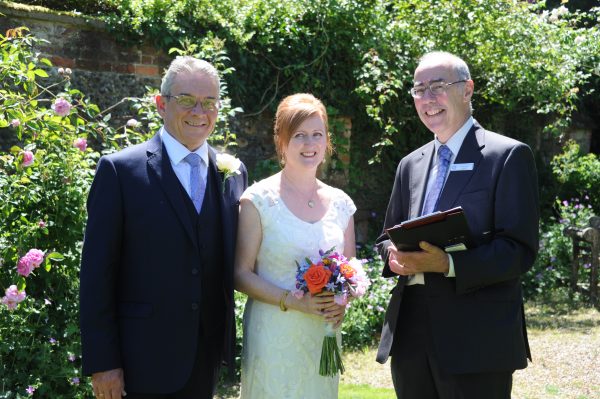
by Michael | Nov 12, 2018 | Blog
Later marriage is surprisingly common these days, even if most people still tend to think of a wedding as a “young person’s thing”.
Why marry when older?
There are a variety of reasons why people tend to marry later.
In many cases, people simply choose to put off their wedding longer to defer responsibility. They want to enjoy themselves before being ‘encumbered’ by a family. They may want to establish a business or career, and need to devote their time to this.
Some people believe they shouldn’t marry until they are ‘sure’ that the relationship has a good chance of lasting. They may lack confidence. They don’t want to ‘get things wrong’. I talked to somebody only the other day who had been engaged for over three years, and only now felt the time was right.
Older people are returning to the marriage market for another go. They may be divorcees or widows/widowers.
Gay couples are able to take advantage of the relatively recent change in the law, and get married. Many of these couples are necessarily quite mature.
Should the ceremony be different?
A church wedding (if permitted) and, indeed, a register office ceremony, will be the same for an 18-year-old or for a 58-year-old. They are basically standard ceremonies.
If you’re looking for a bespoke ceremony, you will need a civil ceremony.
Civil Ceremony suggestions
By the nature of the thing, no two civil ceremonies are likely to be the same, so it is impossible to be prescriptive.
Nevertheless, when approached by more mature couples, I still have the preliminary chat and establish what elements (if any) they have in mind. I make suggestions and then, over time, send them drafts for them to approve.
The areas I am likely to cover include music, rituals and readings.
- Older couples can enjoy the same sort of music as youngsters (if that’s their choice). They may choose the same rituals (a Unity Candle is always lovely, as is the Loving Cup – but older pairs may have families they want to involve, so these rituals may be expanded to include offspring etc.). Either age group may decide to include the offering of a gift, such as a red rose, to their parents during the marriage.
A good celebrant ought be able to supply suitable suggestions.
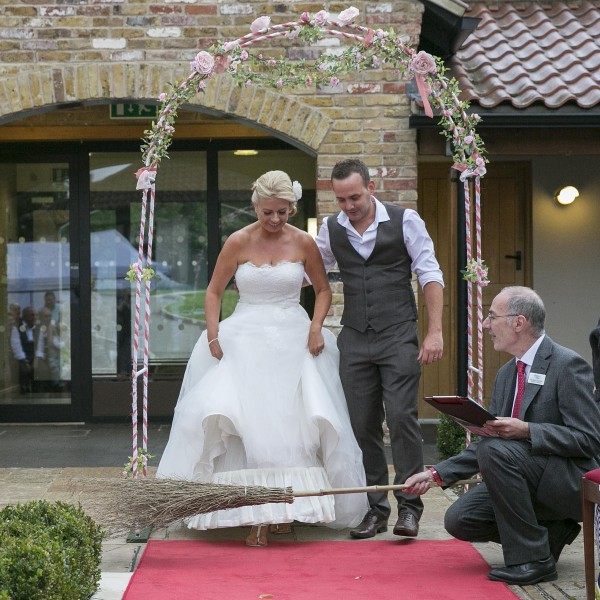
“Jumping the Broom” photo courtesy of www.sa-images.com
Of course, some rituals (such as ‘jumping the broom’) may be less advisable for more mature pairs!
- There’s no reason why age should prevent couples from writing and/or reciting their vows or having the rings blessed.
- Readings can be whatever the couple want, and many are not age-specific in any way. However, some are suitable for more mature couples. I like this anonymous passage (for very mature couples!), and I conclude with it:
“The question is asked: ‘Is there anything more beautiful in life than a young couple clasping hands and pure hearts in the path of marriage? Can there be anything more beautiful than young love?’ And the answer is given: ‘Yes, there is a more beautiful thing. It is the spectacle of an old man and an old woman finishing their journey together on that path. Their hands are gnarled but still clasped; their faces are seamed but still radiant; their hearts are physically bowed and tired but still strong with love and devotion. Yes, there is a more beautiful thing than young love. Old love.’
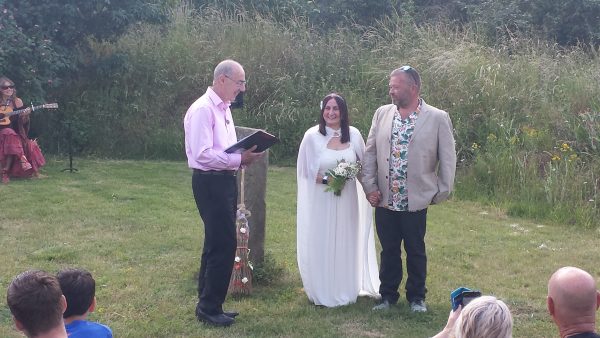
by Michael | Aug 21, 2018 | Blog
The extraordinary is part and parcel of the work of a celebrant.
“I want a Jewish wedding. My boy friend’s not Jewish, but he’s fine with it. At first, my parents wouldn’t have anything to do with the wedding. Now they’re coming round to it, but refuse to allow Jewish traditions in the ceremony. Can you put something suitable together?”
“I’m going to propose to my girl friend in the [5 star] hotel. When she accepts, I want you to come across and conduct an appropriate ceremony. Knock her off her feet!”
“We’re planning a naturist ceremony. Can you compile something for it?”
“Do you do pagan?”
“Actually, we want something quite conventional. Could you do that for us?”
“Can you collaborate with me alone, as I don’t want my fiancé to have anything to do with the ceremony except to be there?”
As a wedding celebrant, I have been asked these, or similar, questions. They give an idea of the range of desires of clients – (well, potential clients, as I didn’t work with all of these) – that I may deal with.
The beauty of what I offer is that the client has freedom to choose exactly what they want for their big day. They may be open to advice and guidance from me; they may have a very clear vision of what they wish for.
Usually, at the preliminary meeting, we have a chance to see if we’d be comfortable working together and start exploring the possibilities. Do they want religion? Yes? Then, how much? Who will be participating in the ceremony? Will any rituals be included? What tone is wanted?
Once the enquiry turns into a booking, I e-mail a draft as soon as possible. This is for the clients’ approval. If they don’t like something, it goes out! They may suggest readings themselves – usually, they’ll be included automatically, as I always bear in mind that it’s the clients’ day. (That doesn’t mean that I haven’t occasionally advised against a certain reading!)
By the end of the process (and the draft may need several partial rewrites), the client should be left with the ceremony of their dreams – every word of which they will have approved.
So, extraordinary as their requests may sometimes be, I can normally take them in my stride. There’s certainly never a dull moment in my job!









